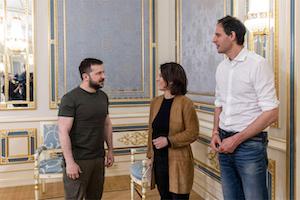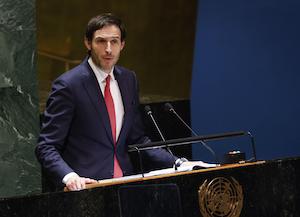The EU has set ambitious goals to protect the planet. The bloc’s current green goals are to achieve climate neutrality by 2050, and 55 per cent fewer greenhouse gas emissions by 2030.
But in August the EU’s climate czar, Frans Timmermans, decided to swap Brussels for The Hague – resigning to lead a Green-Left alliance in the Dutch general election, due in November.
Timmermans’ compatriot Wopke Hoekstra, the former Dutch Minister of Foreign Affairs and Deputy Prime Minister, is tipped to take over the role as climate commissioner. On 2 October, Hoekstra will face intense questioning by MEPs in Strasbourg. But who is he, and is he qualified to become Europe’s commissioner for climate action?
“I feel more like a manager than a professional politician,” Hoekstra said in an interview with Dutch newspaper De Telegraaf back in July. A member of the centre-right Christian Democratic Appeal (CDA), Hoekstra had just announced he would not run in the forthcoming national election.
Simon Otjes, an assistant professor of Dutch politics at the University of Leiden, tells The Parliament Hoekstra could not have described himself any better. Hoekstra is more of a manager than a politician with “inspiring visions”, Otjes says, speaking from the perspective of a political scientist rather than a member of the Dutch Green party.
 Hoekstra with Ukrainian president Volodymyr Zelenskyy and German Green Annalena Baerbock | Photo: Alamy
Hoekstra with Ukrainian president Volodymyr Zelenskyy and German Green Annalena Baerbock | Photo: Alamy
When entering politics in 2011, Hoekstra was a partner at McKinsey & Company. Until 2017, he combined his work at the consultancy firm with a mandate in the Dutch senate. Prior to that, he had worked for the oil and gas company Shell, and studied law. He is part of the Remonstrants – a liberal Protestant movement in the Netherlands – and a father of four.
As part of the Dutch government, he served as finance minister before, in 2022, taking on the dual mantle of minister of foreign affairs and deputy prime minister – roles he held until the summer of 2023. His party colleagues had high hopes for him, and he became leader of the CDA in 2021. The reason: he has a similar profile to current Dutch prime minister Mark Rutte of the liberal People’s Party for Freedom and Democracy (VVD).
“Hoekstra was selected by the Christian Democrats in the expectation that, if Rutte did eventually leave politics, there would be a Rutte-shaped hole he could occupy,” Otjes says.
Still, Hoekstra did not always follow the party’s line. In 2014, he was the only member of the CDA to vote in favour of a legislation making it illegal for marriage officiants to refuse their services to same-sex couples.
Hoekstra’s vote suits the story that he would have been a better fit for the liberals than the Christian Democrats, suggests Otjes. He was, in Otjes’s view, not necessarily a deeply convinced Christian democratic thinker. “Rather, he was somebody who wanted a political career, was a good manager, a good consultant, and happened to get into the Christian Democrats,” Otjes says.
However, in the last couple of years under Hoekstra’s leadership, the CDA struggled as they entered the unpopular coalition with the VVD, Democrats ’66, and Christian Union that fell in July. To make matters worse, the conservatives’ most popular MP, Pieter Omtzigt, left the CDA to form a new party.
Overall, the CDA has lost seats in the Dutch parliament. After the elections in 2017 the party secured 19 out of 150 seats in the Dutch house of representatives, but in 2021 that number fell to 15. Signs are not encouraging for future elections. According to a poll conducted on 7 September by market research company Ipsos Politieke Barometer, the CDA would have won five seats.
He was somebody who wanted a political career, was a good manager, a good consultant, and happened to get into the Christian Democrats
Then, at the end of August, came Hoekstra’s appointment as the new EU commissioner of the climate portfolio. One often-echoed criticism is his lack of experience when it comes to climate policies. The portfolio, however, has been altered. Unlike Timmermans, Hoekstra will not be in charge of the European Green Deal – that has been reassigned to Maroš Šefčovič.
Hoekstra will, among other things, have to ensure the European climate law is implemented, lead international climate negotiations, and guide preparations for developing a 2040 climate target.
“The Netherlands in general has chosen people who are good administrators over people who fit the portfolio,” Otjes says, adding that Timmermans was not particularly occupied with climate before taking office.
Hoekstra’s predecessor could shine with his vast experience in Europe – Timmermans had worked at the Commission before and, within the national borders, served as minister of European affairs. But Hoekstra is not new to European politics either. Since the eurozone crisis, Otjes points out, the ministry of finance is more important within Europe.
When it comes to financial decisions regarding climate, Hoekstra has shown ambition. In 2019, when he was still minister of finance, the Netherlands was the first country with a AAA credit rating to issue a green bond. At the same time, however, the coalition party CDA withdrew from the government’s goal to halve nitrogen emissions by 2030 – with the then party leader calling for more time. What’s more, The Hague supported airline KLM with €3.4b in 2020.
This is why Hoekstra’s nomination has not been widely applauded by environmental groups. The Green 10, an informal network of the largest environmental and climate organisations working in Europe, sent a letter to Ursula von der Leyen in which the NGOs expressed their concern.
“He doesn’t have a lot of expertise on EU climate policy,” Ester Asin Martinez, director of WWF’s European Policy Office and current chair of the Green 10, tells The Parliament. “True, he was a foreign affairs minister, but he hasn’t really led climate diplomacy at the level of the UN,” she says. Aside from having worked for Shell, his performance in public roles as part of the Dutch government make the NGOs question his qualification.
MEPs from the Greens and the Socialists and Democrats (S&D) have reacted to his appointment with scepticism. Others have been more supportive. Hoekstra can already count on the vote of Peter Liese, the EPP Group’s spokesperson on environmental issues. “As a former foreign minister, he has the right qualifications,” Liese says, referring to the climate role’s need for international diplomacy. “He was in the Emirates and China at the beginning of the year to prepare for the [climate change conference] COP.”
Liese stresses that his Dutch party colleague has more experience in climate policy than many other commissioners-designate had in their respective areas before taking office. Regarding Hoekstra’s positions before politics, Peter Liese maintains: “It’s been a long time since he worked for Shell, and Wopke Hoekstra certainly has a critical, distant relationship with this company’s fossil investments.”
 Hoekstra at the UN | Photo: Alamy
Hoekstra at the UN | Photo: Alamy
So, what are the odds of his confirmation? Otjes expects Hoekstra to be more successful now than when he was first appointed. One reason is his decision to keep climate expert Diederik Samsom in post as head of Cabinet. This is seen as “an important signal” both to the S&D, as Samsom was a social-democratic MP, and to environmental groups.
Moreover, Margrethe Vestager, European competition commissioner, might be leaving the college, meaning the Danish government can appoint a successor. “Given that the social-democrats lead the Danish government, the next Danish commissioner is likely to be a social-democrat,” Otjes explains. Therefore the S&D will be more accepting of Hoekstra then if Vestager were to remain.
The election will most likely take place a couple of days after the hearing; a simple majority is required. If he convinces the members of the environment, industry, foreign affairs and development committees in Strasbourg, Hoekstra’s mandate will last until the European elections in June.
Sign up to The Parliament's weekly newsletter
Every Friday our editorial team goes behind the headlines to offer insight and analysis on the key stories driving the EU agenda. Subscribe for free here.